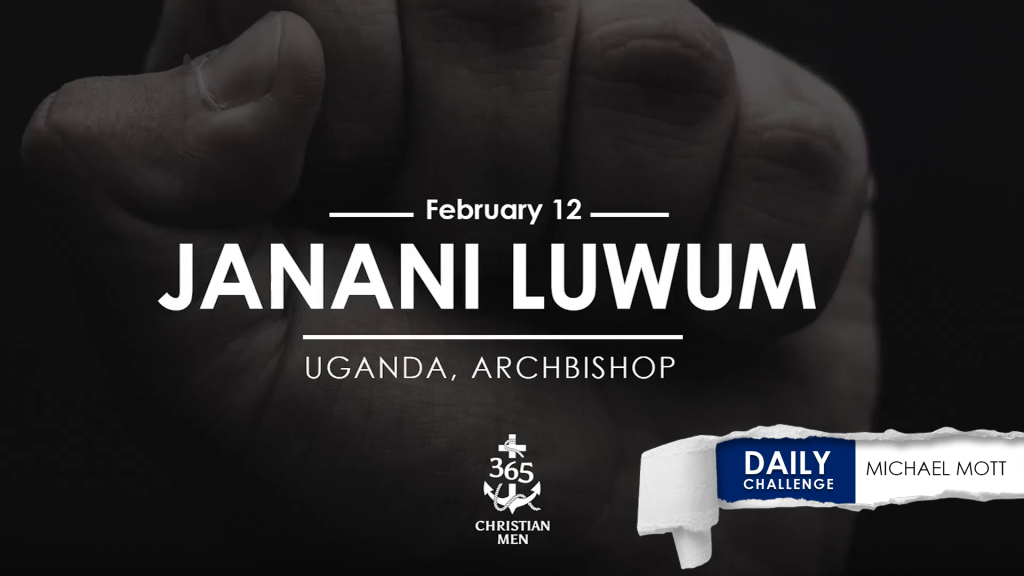February 12. Janani Luwum. In 1977, Uganda roiled with fear. In 1971, Field Marshall Idi Amin violently overthrew the elected government and named himself President. He was known as the Butcher of Uganda, and his nickname was The Machete. During his reign, he massacred hundreds of thousands of civilians. In 1972, he ruthlessly drove all Indian and Pakistani citizens out of Uganda, which helped wreck the Ugandan economy. Amin was a brutal dictator.
And Janani, the archbishop of Northern Uganda, was his opposite. In 1948, when Janani was a young school teacher, he converted to the charismatic Christianity and became a vocal evangelist. When he was consecrated bishop in 1969, in the congregation stood the prime minister of Uganda and his Chief of Staff of the army, Idi Amin.
On this date in 1977, Janani confronted Idi Amin and condemned his persistent acts of violence.
When evil threatens, a man must confront the darkness, no matter the cost.
Janani knew his personal mission—to “defend the people, to expose evil, to call for justice and human rights.”
A giant of a man, Janani had a smile that put everyone at ease. His preaching, faith, and benevolence earned him great influence. No matter how popular he became, he exuded a simple, easy-going confidence.
In 1974, when Janani was nominated for Archbishop of Uganda, he knew it wouldn’t be easy. Anyone who stood up to Amin’s cruel regime soon disappeared. Permanently.
But Janani believed God would “guide him and give him the courage” to do His work.
Amin and Janani forged a tenuous relationship. Janani attended government functions, and publicly, Janani prayed for Amin.
“We must pray for him. He is a child of God,” he said. But privately Janani challenged Amin and advocated for those whom Amin had wrongly killed and imprisoned.
Opponents criticized Janani for associating with Amin.
Janani answered them gently. “I live as though there will be no tomorrow,” he said. “I face daily being picked up by the soldiers. While the opportunity is here, I preach the gospel with all my might … I have not sided with the present government, which is utterly self-seeking. I have been threatened many times. Whenever I have the opportunity, I have told the President the things the churches disapprove of.”
Amin accused the church of preaching hatred against the state.
Janani’s wife and friends begged him to flee, but he chose to stay. And he chose to fight. He chose to pastor his people. “If I, the shepherd, flee,” he said, “what will happen to the sheep?”
But as Amin’s outrageous brutality escalated, Janani’s appeals to—and disapproval of—Amin had to become more public. He couldn’t be an honest man and keep quiet. Janani “became a powerful voice of prayer and hope for … a country in agony.” In his Christmas sermon, broadcast live on the radio, Janani called Amin’s regime “ruthless.”
Mid-broadcast, the government stopped the program. Silence.
In January, as other pastors followed Janani’s example and preached against Amin’s regime, tension grew. In the middle of the night on February 5, 1977, soldiers forced their way into Janani’s home, allegedly looking for guns.
Janani told them, “I have no weapon but the Bible.”
On February 10, Janani and his fellow bishops wrote a letter to Amin. It highlighted the murderous violence and breakdown of civil rule. The bishops demanded that Amin meet with them to reconcile his differences with the church.
Janani boldly sent copies to Amin’s cabinet members and hand carried the letter to the president’s office. Janani knew he had signed his death sentence.
After a February 16 trial in a kangaroo court, Janani told Bishop Kivengere, “They are going to kill me. I am not afraid.”
He said he saw “God’s hand” in the situation.
“You intended to harm me, but God intended it all for good. He brought me to this position so I could save the lives of many people” (Genesis 50:20 NLT).
The next day, Radio Uganda broadcast that Janani had died in a car accident, but multiple bullet holes in his body told the real story.
The murder of Janani was the wake-up call the international community needed and a pivotal turning point for the break-down of Idi Amin’s regime.
Janani “chose the path of speaking truth to power.” He defended the people, exposed evil, and called for justice and human rights.
What darkness must you confront? When evil threatens, a man must confront the darkness, no matter the cost.
Otunnu, Olara. Archbishop Janani Luwum: The Life and Witness of a 20th Century Martyr. Kampala, Uganda: Fountain Publishers, 2015.
“What was it about Janani Luwum that irked Amin?” Published February 11, 2015. New Vision. https://www.newvision.co.ug/new_vision/news/1320623/about-janani-luwum-irked-amin.
Kyemba, Henry. A State of Blood: The Inside Story of Idi Amin’s Reign of Terror. New York: Ace Books, 1977.
Every, George, Richard Harries, and Kallistos Ware, eds. The Time of the Spirit. Crestwood, NY: St Vladimir’s Seminary Press, 1984.
“I was one of the last people to see Jananu Luwum Alive.” Published February 15, 2018. UGCN. http://ugchristiannews.com/i-was-one-of-the-last-people-to-see-janani-luwum-alive/.
Kagenda, Patrick. “St. Janani Luwum: Uganda’s forgotten martyr.” May 31, 2014. The Independent. https://www.independent.co.ug/st-janani-luwum/.
Story read by Daniel Carpenter





